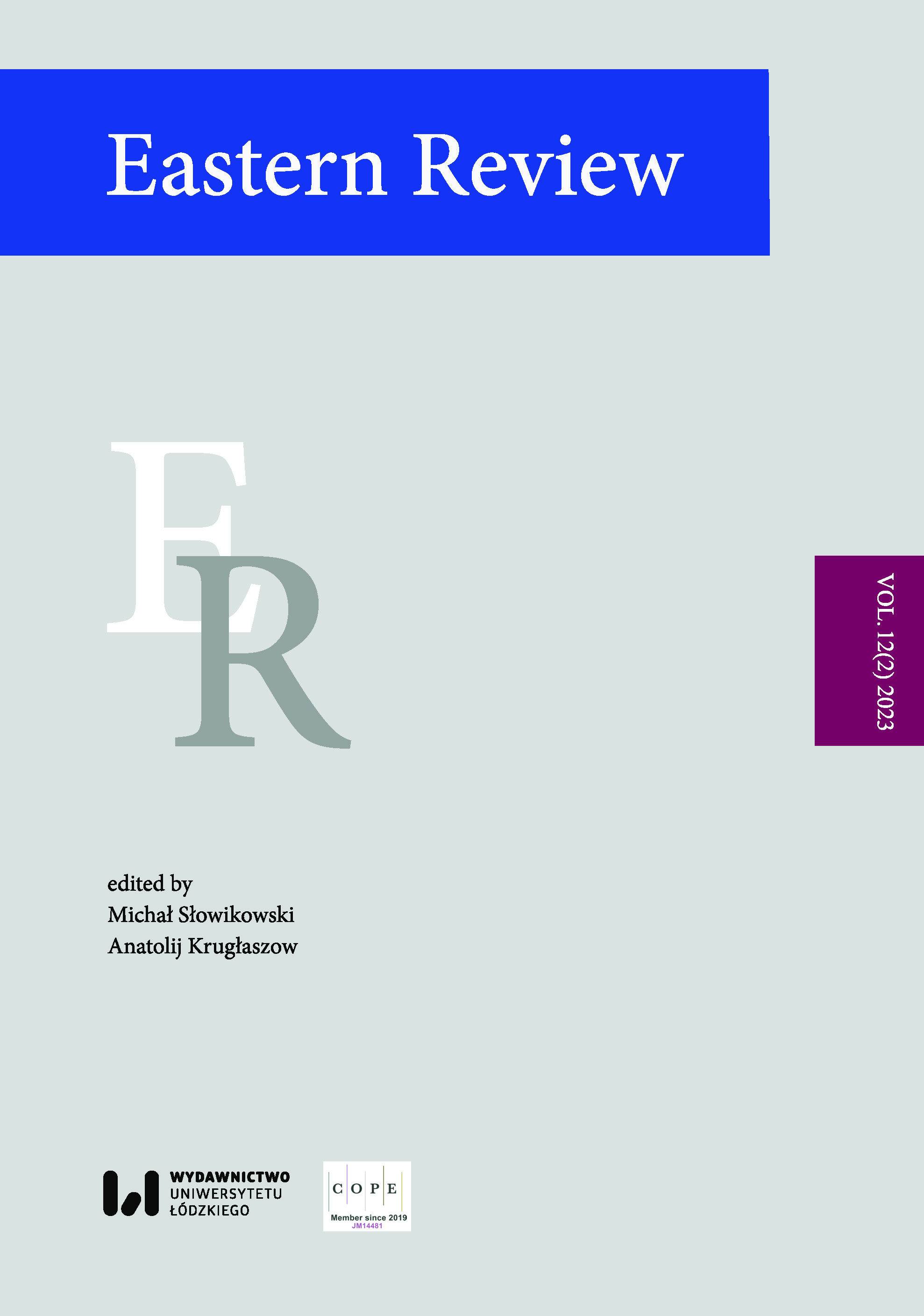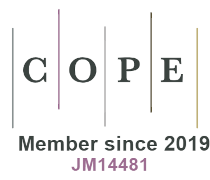Misperception in Foreign Policy as a By-Product of a Dogmatic Ideology: The Case of Russia’s War in Ukraine
DOI:
https://doi.org/10.18778/1427-9657.12.09Keywords:
war in Ukraine, misperception, dogmatic ideology, terror management theory, Russia, PutinismAbstract
The article examines how dogmatic ideology leads to misperceptions in foreign policy, using Russia’s actions in Ukraine as a case study. Specifically, the authors aim to show how Russia’s dogmatic ideology has led to significant misperceptions in its foreign policy towards Ukraine, resulting in aggressive actions and escalating conflicts. The central research problem addressed in this article is the impact of dogmatic ideologies on foreign policy decision-making. For the sake of the paper, we conceptualise the ideology of “Putinism”. The article explores how this ideology acts as a cognitive filter, shaping and often distorting the perceptions of political leaders. This leads to misinterpretations of other nations’ intentions and actions, as exemplified by Russia’s misperception of the events in Ukraine as a Western conspiracy rather than a grassroots movement against corruption and authoritarianism. The authors conclude that dogmatic ideologies significantly contribute to foreign policy misperceptions, leading to flawed and often aggressive decisions. In the case of Russia, these misperceptions have resulted in severe international consequences, including economic sanctions, diplomatic isolation, and a protracted conflict in Ukraine. The article highlights the necessity for policymakers to recognise and mitigate the influence of dogmatic ideologies in order to avoid such detrimental misperceptions. The research also suggests that highly dogmatic systems are more prone to strategic failures due to their rigid belief structures and resistance to new information.
References
Barbashin, A., Thoburn, H. 2014. Putin’s Brain: Alexander Dugin and the Philosophy Behind Putin’s Invasion of Crimea. Foreign Affairs, https://www.foreignaffairs.com/articles/russia-fsu/2014-03-31/putins-brain (accessed: 18.09.2024).
Google Scholar
Berger, J.M. 2017. Extremist construction of identity: how escalating demands for legitimacy shape and define in-group and out-group dynamics. ICCT Research Paper, https://icct.nl/wp-content/uploads/2017/04/ICCT-Berger-Extremist-Construction-of-Identity-April-2017-2.pdf (accessed: 18.09.2024). https://doi.org/10.19165/2017.1.07
Google Scholar
DOI: https://doi.org/10.19165/2017.1.07
Bolechów, B. 2020. Gdy światło się mroczy. Światopogląd Państwa Islamskiego w perspektywie Teorii Opanowywania Trwogi. Toruń.
Google Scholar
Bolechów, B. 2022. The Islamic State’s Worldview as a Radical Terror Management Device. Studia Politologiczne 63(4), pp. 61–85. https://doi.org/10.33896/SPolit.2022.63.4
Google Scholar
DOI: https://doi.org/10.33896/SPolit.2022.63.4
Bryanski, G. 2012. Russian patriarch calls Putin era “miracle of God”. Reuters, https://www.reuters.com/article/uk-russia-putin-religion-idUKTRE81722Y20120208 (accessed: 18.09.2024).
Google Scholar
Burns, W.J. 2024. Spycraft and Statecraft. Transforming the CIA for an Age of Competition. Foreign Affairs, March/April 2024.
Google Scholar
Edenborg, E. 2022. Putin’s Anti-Gay War on Ukraine. Boston Review, March 14, https://www.bostonreview.net/articles/putins-anti-gay-war-on-ukraine/ (accessed: 19.09.2024).
Google Scholar
Friedberg, A.L. 2017. The rise of China and the future of the West: Can the liberal system survive? Foreign Affairs 96(5), pp. 10–16.
Google Scholar
Gat, A. 2022. Ideological Fixation: From the Stone Age to Today’s Culture Wars. Oxford: Oxford University Press. https://doi.org/10.1093/oso/9780197646700.001.0001
Google Scholar
DOI: https://doi.org/10.1093/oso/9780197646700.001.0001
Garner, I. 2022. Putin’s Holy War: The Messianic Myths Fueling Russia’s Assault on Ukraine. Haaretz, https://www.haaretz.com/world-news/2022-05-11/ty-article-opinion/.premium/putins-holy-war-the-messianic-myths-fueling-russias-assault-on-ukraine/00000180-d65b-d452-a1fa-d7ff0ad60000 (accessed: 19.09.2024).
Google Scholar
Hale, H.E. 2015. Patronal politics: Eurasian regime dynamics in comparative perspective. Cambridge University Press. https://doi.org/10.1017/CBO9781139683524
Google Scholar
DOI: https://doi.org/10.1017/CBO9781139683524
Imhoff, R., Lamberty, P. 2018. How paranoid are conspiracy believers? Toward a more fine-grained understanding of the connect and disconnect between paranoia and belief in conspiracy theories. European Journal of Social Psychology. Special Issue: Belief in Conspiracy Theories as a Social-Psychological Phenomenon 48(7), pp. 909–926, https://doi.org/10.1002/ejsp.2494
Google Scholar
DOI: https://doi.org/10.1002/ejsp.2494
Jenkins, B.M. 2023. The Three Vladimir Putins. The RAND Blog, https://www.rand.org/blog/2023/02/the-three-vladimir-putins.html (accessed: 18.09.2024).
Google Scholar
Kolesnikov, A. 2023. The End of the Russian Idea. Foreign Affairs, September/October 2023.
Google Scholar
Landau, M.J., Goldberg, J.L., Greenberg, J., Gillath, O., Solomon, S., Cox, C., Martens, A., Pyszczynski, T. 2006. The Siren’s Call: Terror Management and the Threat of Men’s Sexual Attraction to Women. Journal of Personality and Social Psychology 90(1), p. 144. https://doi.org/10.1037/0022-3514.90.1.129
Google Scholar
DOI: https://doi.org/10.1037/0022-3514.90.1.129
Laruelle, M. 2015. Russian nationalism, Ukraine, and the geopolitics of the Eurasian project. Demokratizatsiya: The Journal of Post-Soviet Democratization 23(3), pp. 373–395. https://doi.org/10.1080/1060586X.2013.872453
Google Scholar
DOI: https://doi.org/10.1080/1060586X.2013.872453
Laruelle, M. 2017. Russia’s Ideology: Change and Continuity in National Identity Under Putin. Post-Soviet Affairs 33(4), pp. 276–298.
Google Scholar
Lister, T., Pennington, J. 2022. Who is Alexander Dugin, the high priest of a virulent brand of Russian nationalism? CNN, https://edition.cnn.com/2022/08/21/europe/alexander-dugin-russia-profile-intl/index.html (accessed: 15.09.2024).
Google Scholar
Martinez, A.P., Shevlin, M., Valiente, C., Hyland, P., Bentall, R.P. 2022. Paranoid beliefs and conspiracy mentality are associated with different forms of mistrust: A three-nation study. Frontiers in Psychology 15. https://doi.org/10.3389/fpsyg.2022.1023366
Google Scholar
DOI: https://doi.org/10.3389/fpsyg.2022.1023366
“Meeting with mothers of military personnel: Participants in the special military operation”. November 25, 2022, http://en.kremlin.ru/events/president/news/69935 (accessed: 15.09.2024).
Google Scholar
Østbø, J. 2016. Securitizing “spiritual-moral values” in Russia. Post Soviet Affairs, http://dx.doi.org/10.1080/1060586X.2016.1251023 (accessed: 17.09.2024).
Google Scholar
DOI: https://doi.org/10.1080/1060586X.2016.1251023
Patriarch of Moscow: Any Russian soldier who dies in the war in Ukraine is forgiven for his sins. Orthodox Times, September 26, 2022, https://orthodoxtimes.com/patriarch-of-moscow-any-russian-soldier-who-dies-in-the-war-in-ukraine-is-forgiven-for-his-sins/ (accessed: 15.09.2024).
Google Scholar
Putin, V. 2021. On the Historical Unity of Russians and Ukrainians, http://en.kremlin.ru/events/president/news/66181 (accessed: 14.09.2024).
Google Scholar
Putin, V. 2022. Address by the President of the Russian Federation, http://en.kremlin.ru/events/president/news/67828 (accessed: 15.09.2024).
Google Scholar
Putin, V. 2023. Presidential Address to Federal Assembly, http://en.kremlin.ru/events/president/news/70565 (accessed: 16.09.2024).
Google Scholar
Radkiewicz, P. 2007. Several reasons why social anomie and political alienation may influence ethnocentric attitudes. The compensating role of authoritarian-paranoid beliefs. Polish Psychological Bulletin 38(1), pp. 5–14.
Google Scholar
Riabchuk, M. 2022. A Long Ongoing War. Putin’s Imaginary Ukrainians and a Mythic Russian Identity. Centre de Recherches Internationales, https://www.sciencespo.fr/ceri/fr/content/dossiersduceri/long-ongoing-war-putin-s-imaginary-ukrainians-and-mythic-russian-identity (accessed: 15.09.2023).
Google Scholar
Roth, A. 2022. Putin compares himself to Peter the Great in quest to take back Russian lands. Guardian, https://www.theguardian.com/world/2022/jun/10/putin-compares-himself-to-peter-the-great-in-quest-to-take-back-russian-lands (accessed: 16.09.2023).
Google Scholar
Rožič, P. 2015. The Paranoid State. Demokratizatsiya: The Journal of Post-Soviet Democratization 23(1), pp. 77–94.
Google Scholar
Russian News Agency TASS. 2023. West launches ‘war of reason’ against Russia. Kremlin official, https://tass.com/world/1644921 (accessed: 15.09.2023).
Google Scholar
Shevtsova, L. (2019). Russia’s post-Putin future. Journal of Democracy 30(1), pp. 46–59.
Google Scholar
Signing of treaties on accession of Donetsk and Lugansk people’s republics and Zaporozhye and Kherson regions to Russia. 2022. http://en.kremlin.ru/events/president/news/69465 (accessed: 15.09.2023).
Google Scholar
Stoeckl, K., Uzlaner, D. 2022. The Moralist International: Russia in the Global Culture Wars. Fordham University Press. https://doi.org/10.1515/9781531502126
Google Scholar
DOI: https://doi.org/10.1353/book.103605
Tsygankov, A.P. 2014. Russia’s foreign policy: Change and continuity in national identity. Rowman & Littlefield.
Google Scholar
Zheng, S., Marcos, M., Stewart, K.E., Szabo, J., Pawluk, E., Girard, T.A., Koerner, N. 2022. Worry, intolerance of uncertainty, negative urgency, and their associations to paranoid thinking. Personality and Individual Differences 186(A). https://doi.org/10.1016/j.paid.2021.111382
Google Scholar
DOI: https://doi.org/10.1016/j.paid.2021.111382
http://en.kremlin.ru/events/president/news/66181
Google Scholar
https://www.aspistrategist.org.au/why-putin-sees-the-us-nato-and-ukraine-as-a-threat/
Google Scholar
https://www.justsecurity.org/81789/russias-eliminationist-rhetoric-against-ukraine-a-collection/
Google Scholar
https://www.reuters.com/world/europe/putin-russia-must-take-into-account-nato-nuclear-capability-state-tv-2023-02-26/
Google Scholar
https://www.youtube.com/watch?v=7FyFkAyqn4Q&ab_channel=MichaelRossiPoliSci
Google Scholar
https://www.youtube.com/watch?v=IpuxYjYguR4&t=47s&ab_channel=SputnikBR
Google Scholar
Published
Versions
- 2024-12-30 (2)
- 2024-12-30 (1)
How to Cite
Issue
Section
License
Copyright (c) 2023 Bartosz Bolechów, Karol Szulc

This work is licensed under a Creative Commons Attribution-NonCommercial-NoDerivatives 4.0 International License.










